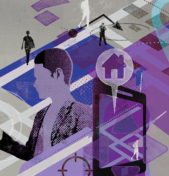Scientists are looking for answers by delving into how the human body responds to feeling alienated. By concentrating on understanding the genetics and biological mechanisms involved, researchers are on the path to solutions, if not to eradicate loneliness, then at least to blunt its harmful effects.
"Put simply, lonelier people feel worse when they are sick than less lonely people," Dr. Chris Fagundes and his co-authors wrote in their 2017 paper, published in the American Psychological Association journal Health Psychology.
Fagundes says he suspects the increased misery is not just a matter of perception. Loneliness, it seems, actually does make people sicker. Study after study suggests loneliness is a health hazard, raising a person's risk of a wide range of illnesses from cardiovascular disease and cancer to depression and dementia.
The health consequences of loneliness have become the focus of widespread public dialogue in recent years, as media such as The New York Times, Forbes and the BBC warn of a loneliness "epidemic." Britain's government appointed a new "minister for loneliness" in January to help address the health and social toll of loneliness.
Loneliness is distinct from the number of friends a person has or how much time he or she spends alone, but is rather defined by a longing for greater social interaction. In other words, you are lonely when your appetite for social interaction is unsatisfied. So, just as you may be able spend your days alone but never feel lonely, you could be constantly surrounded by friends and family yet still be wanting.
CLICK HERE to read more.






